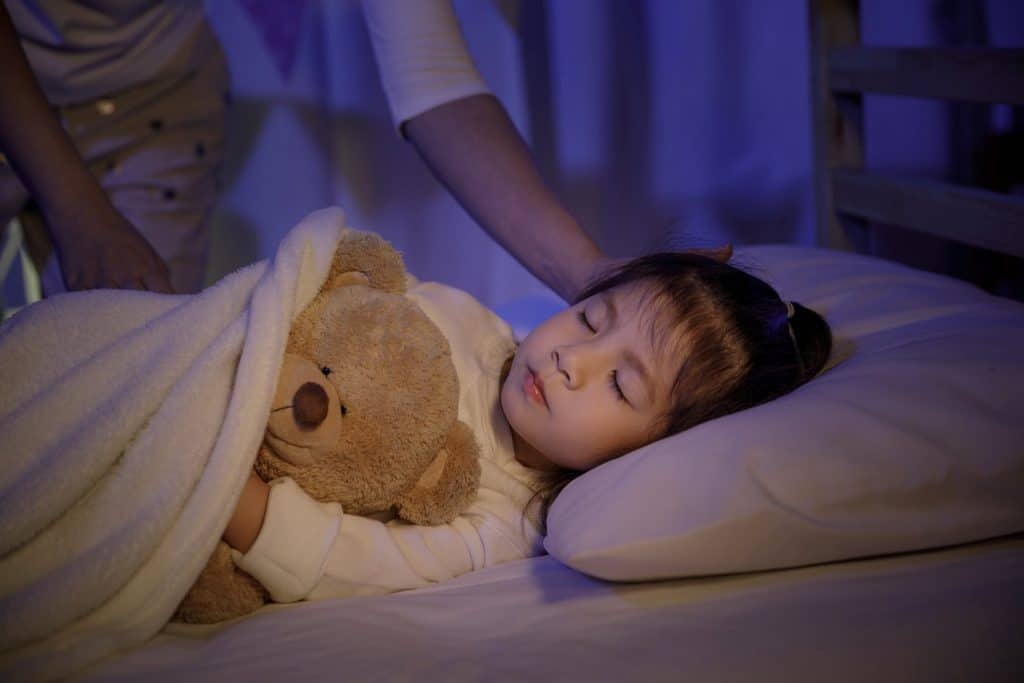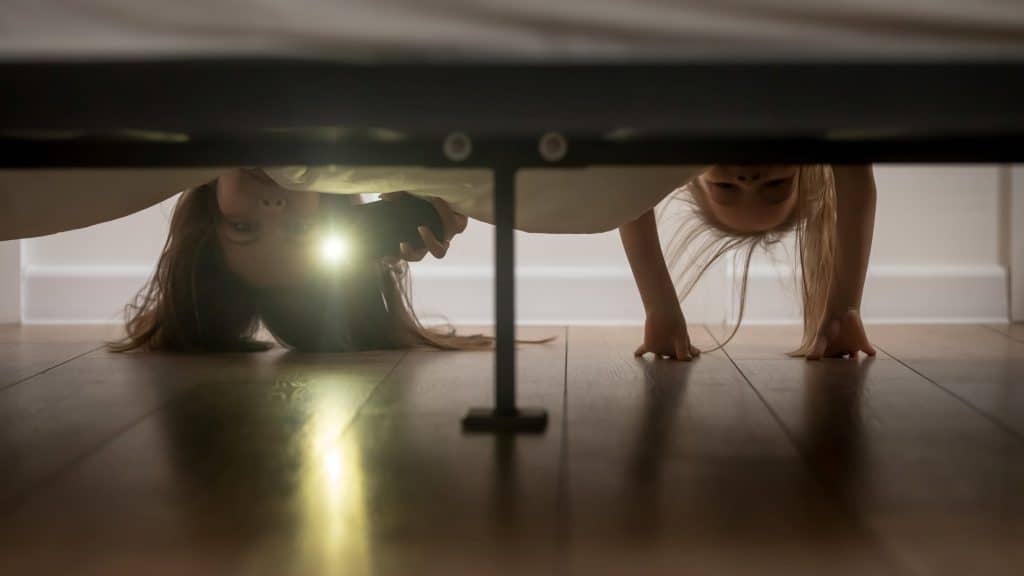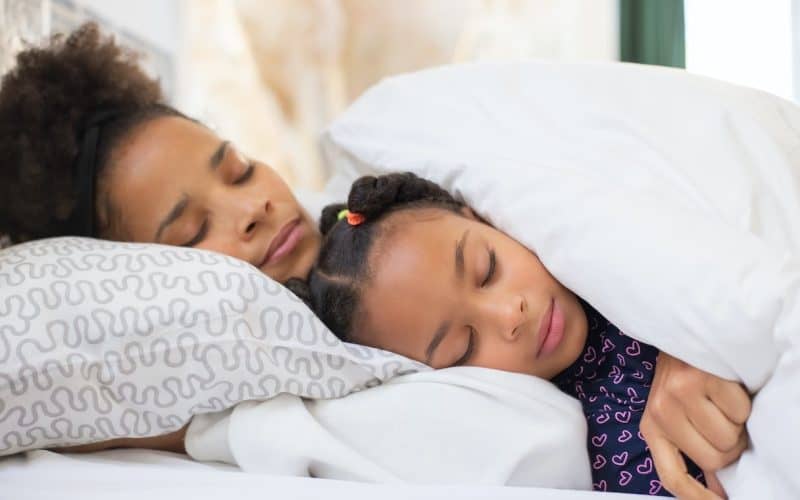It’s a comforting feeling when your little one snuggles up to you before bedtime, but past a certain age, they need to be brave enough to lie down and nap on their own. It’s common for kids to be afraid of sleeping alone at night, but how do you get them brave enough to overcome those fears?
Your child is going to resist this change, so ease them through the process. Accompany them early on, then gradually reduce your presence before bed.
Be a patient listener, but don’t indulge their hyperactive imagination. It’s okay to be frustrated at times, but remember that you’re doing this for them. Prove that there’s nothing your child should be afraid of when they start sleeping alone.
While their fears are imaginary, how they affect your child is tangibly real. Don’t expect your child to just “get over it” because you told them to. Right now, they need patience – not pressure!
What to Do When Your 9-Year-Old is Afraid to Sleep Alone
1. Consider Your Differences with Them First

Mindset Differences
A child’s mind is very different from an adult’s, being driven primarily by emotion over logic. They tend to lack impulse control, and often drift between behavior extremes rather than balance.
They’re not stupid by any means: just inexperienced.
It’s part of their current developmental state, which your child will grow out of in time. You can’t rush this process without jeopardizing their emotional health (and your relationship with them).
Parents might feel annoyed by their children’s stubbornness, viewing this issue as a rational one. They might think that their child is being difficult on purpose, but what would they have to gain? Your nine-year-old isn’t trying to manipulate you here – they haven’t even hit double digits yet!
Accept that your child won’t think the same way you do, and recognize how important it is to meet them on their terms. They aren’t adults yet, and holding them to such standards won’t work well. It’s okay if you can’t fully grasp where they’re coming from – just don’t force them to fall in line.
Valid Frustration
Your child being too afraid to sleep alone is a valid source of frustration. Having to accommodate their situation will cost you precious time, rest, and peace of mind. Recognizing and acknowledging that is fine – it won’t make you any less of a parent.
It’s fine to be annoyed with your kid from time to time – just don’t let it dictate your behavior.
Being a parent isn’t about perfection: it’s about caring for the needs of another, no matter what. That doesn’t mean you should pretend those problems don’t exist: you’ll just end up bottling those negative feelings up. They’ll boil over in time, and someone could get hurt from that.
It’s definitely a headache if your kid’s afraid of sleeping alone, but the fact that they came to you with this (or at minimum admitted to the problem over withholding it) shows that they trust you. Don’t ever punish your child for being honest – they need to feel that they’re safe to approach you with sensitive topics that bother them.
There’s no shame in feeling tired of irritated with the situation at times – just don’t let these emotions cloud your judgment. Accept that frustration as part of the experience, but not one that decides anything for you.
Remember that having these feelings won’t detract from your worth as a parent. Hiding these feelings, on the other hand, could bite you on the backside if you lose control just once!
2. Stick Around for a Bit Before Bed

Getting your child over their fear of sleeping by themselves takes a lot of time and commitment. Reassurance alone won’t cut it – be there for them, especially early into the transition!
Separation Anxiety
While it is crucial that your kid needs to get through this change on their own, that doesn’t mean they have to be alone for the entire process. They feel safer in your presence, so bear with them.
Your child might feel separation anxiety the moment you leave the vicinity. These feelings will only intensify if you keep doing this abruptly. They won’t ever “toughen up” so much as grow desensitized to you leaving, and they might be left feeling abandoned rather than supported.
Instead, be there for them early on, but gradually reduce your own presence. Sit by their bedside until they nod off, then start leaving just a little bit earlier every few days. Be there for them, but work to gently wean them off the emotional dependence they feel.
Never cut them off entirely – unless you want to lose your relationship with them too!
Reading
We’d strongly recommend reading to your child before bed. This type of activity allows your little one to rest their eyes and focus solely on your voice, allowing sleep to come easier.
Do be sure to keep your stories on the simpler side – something too intense or scary might rile them up, making it difficult for them to calm down. Keep a gentle, monotone voice while reading for similar reasons.
If your kid takes a while to doze off this way, it might be wise to bring a few spare books. This activity works best if you can keep your child occupied for as long as they need to rest.
What to Do After
Just because your child looks all tuckered out doesn’t mean they won’t wake up at some point. Kids learning to sleep on their own might wake themselves up intermittently – it could be them consciously checking for your presence or just their bodies acting out due to the change.
To deal with this, drop in on your child to check in through the course of the night. Be sure to let your kid know first, though!
Let your child know that you’ll be checking in on them, but make them promise to do their best to sleep through the entire night. As their sleep schedule adjusts to the change, you could then decrease the frequency and duration of these check-ins.
Your child will eventually reach a point where they can sleep through the night all on their own. The early parts of this change are by far the hardest, but once that hurdle is clear everything else should neatly fall into place.
3. Look Into Security Blanket-Like Items

While the main issue of your child being afraid to sleep alone is likely related to their attachment to you, it might be worth providing them with a security blanket of sorts to ease their journey. For best results, tailor your purchase to tackle whatever that’s specifically bothering them.
Below are a few popular choices to soothe some of your child’s anxieties about sleeping alone. If you aren’t sure what would help, just approach your child and ask them what they’d prefer!
Lights
If your child is afraid of the dark, a small nightlight would be a huge comfort. You can’t just get any nightlight for them though, as certain colors can adversely affect the body’s circadian rhythm.
Avoid white and blue light devices, as these inhibit the body’s melatonin production. Melatonin serves as a sleep hormone and is sorely needed for anyone who wants a good night’s rest.
Seek out gentle, ambient lights for this purpose. Red light, in particular, has a lower frequency than other wavelengths. It’s been theorized to help induce sleepiness via stimulating melatonin production in the brain. It’s even being used in some experimental sleep therapy procedures!
Cuddles
Your child might miss being able to snuggle up by your side at night. They could be accustomed to your warmth and presence, and the absence of it leaves them feeling restless and antsy.
Give them what they want! A big pillow, plushie, or even weighted blanket can give them something to hold onto. We’d recommend having more than one option on hand here over letting your child get attached to just one thing – their emotional dependence would make regularly cleaning the item in question difficult.
Company
Lastly, your child might just feel lonely in their room. Some companionship could take away those feelings, providing your child with the crucial peace of mind they need to sleep alone soundly.
Pets would be great for this – a dog or cat by their bedside might be just what they need. There’s a small chance that your kid might bring said pet up the bed to sleep beside them, though. While it’s not really a bad thing, some parents won’t be comfortable with the hygiene risk.
While you could get your kid to promise not to do that, there’s nothing to stop them beyond their own sense of discipline. Avoid this issue altogether by giving them a pet they can’t cuddle up with – maybe a fish, for starters! The final decision on what to get your kid is still ultimately yours.
4. Clear Out Hidey Holes (But Don’t Hunt Bedroom Monsters!)

A child’s imagination can make things way scarier than they actually are. Left to their own devices, most of them would simply strengthen those unhealthy assumptions.
Their young minds can trick them at times, making mundane things terrifying for no reason.
A dark closet won’t be hiding monsters ready to pounce. The buzzing outside their window could just be insects getting restless in the dead of night.
There’s nothing to fear when sleeping in your own room – your child just needs a gentle, constant reminder of that, even when their imagination is fighting them at every turn!
The best way to proceed would be by doing what you can to peel those assumptions away.
If they’re scared of monsters under your bed, stick a flashlight under the mattress and prove them wrong! Open the closet and show that bad things couldn’t fit in there if they tried.
Don’t just tell your kid that monsters aren’t real: show it to them! These fears are only as real as they allow them to be. Every moment you spend chipping away at those assumptions will contribute to improving your child’s peace of mind.
Avoid “Monster Hunting” with Them
It’s tempting to go a little further than this, taking your kid on a trip to hunt down the monsters hiding in their room with nothing but a flashlight and good cheer! It might seem like a nice, playful bonding opportunity, but doing this is actually not a good idea.
Here’s why:
Even if you think it’s just a joke, your child might take you at face value. You could end up validating their irrationalities rather than their feelings. That makes the monsters real in their eyes, and you’d simply reinforce their irrational assumption instead of dissuading them from it!
You don’t even want to take a chance of doing anything that could enable these anxieties. Make sure that while their fear is valid, the things behind it aren’t real enough to hurt them.
5. Keep Them Away from “Scary” Things
Children have active imaginations, and the last thing you want to do is give them more fodder to overthink with. A lot of families nowadays leave their kids to their own devices, letting them skim YouTube and other sites to occupy their attention. Alternatively, friends or family might be bringing them along to binge that type of content.
What they watch may not be appropriate for their age. They might be watching scary movies or games, exposing them to a space where their imagination can get the better of them.
Don’t let your child expose themselves to scary things like this when they’re already afraid of sleeping alone – getting them through this is hard enough already!
Final Thoughts
For young kids, learning to sleep alone is one of the hardest things for them to do. They don’t think the way adults do, so you’ve got to meet them halfway for any progress you want to accomplish. You’re allowed to be frustrated with the process at times. Just don’t expect them to “get over it” while they’re trying to change for the better! Never let these feelings cloud your judgment or influence how you treat your kid.
